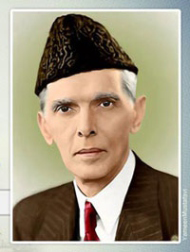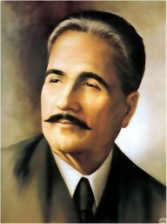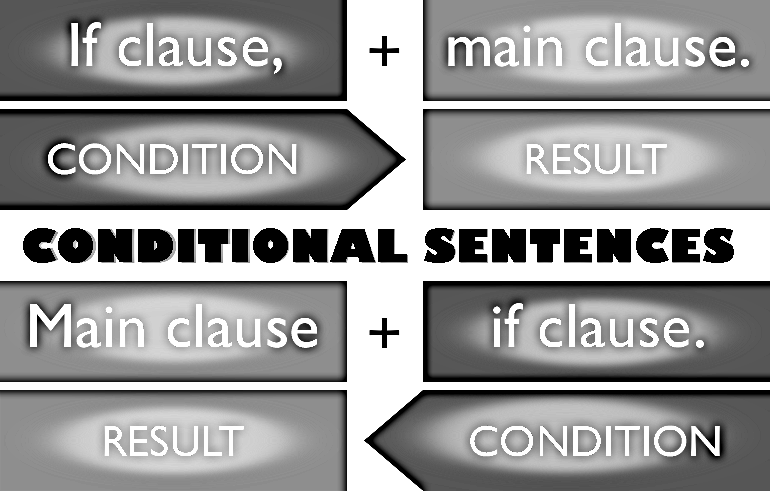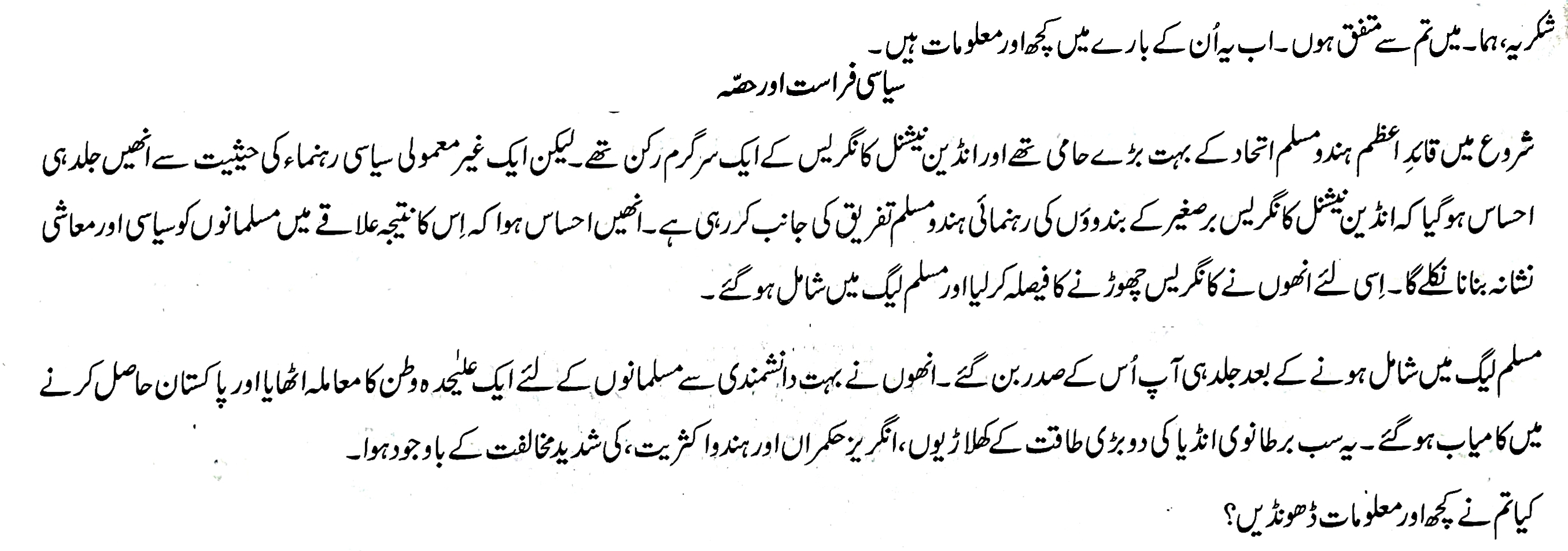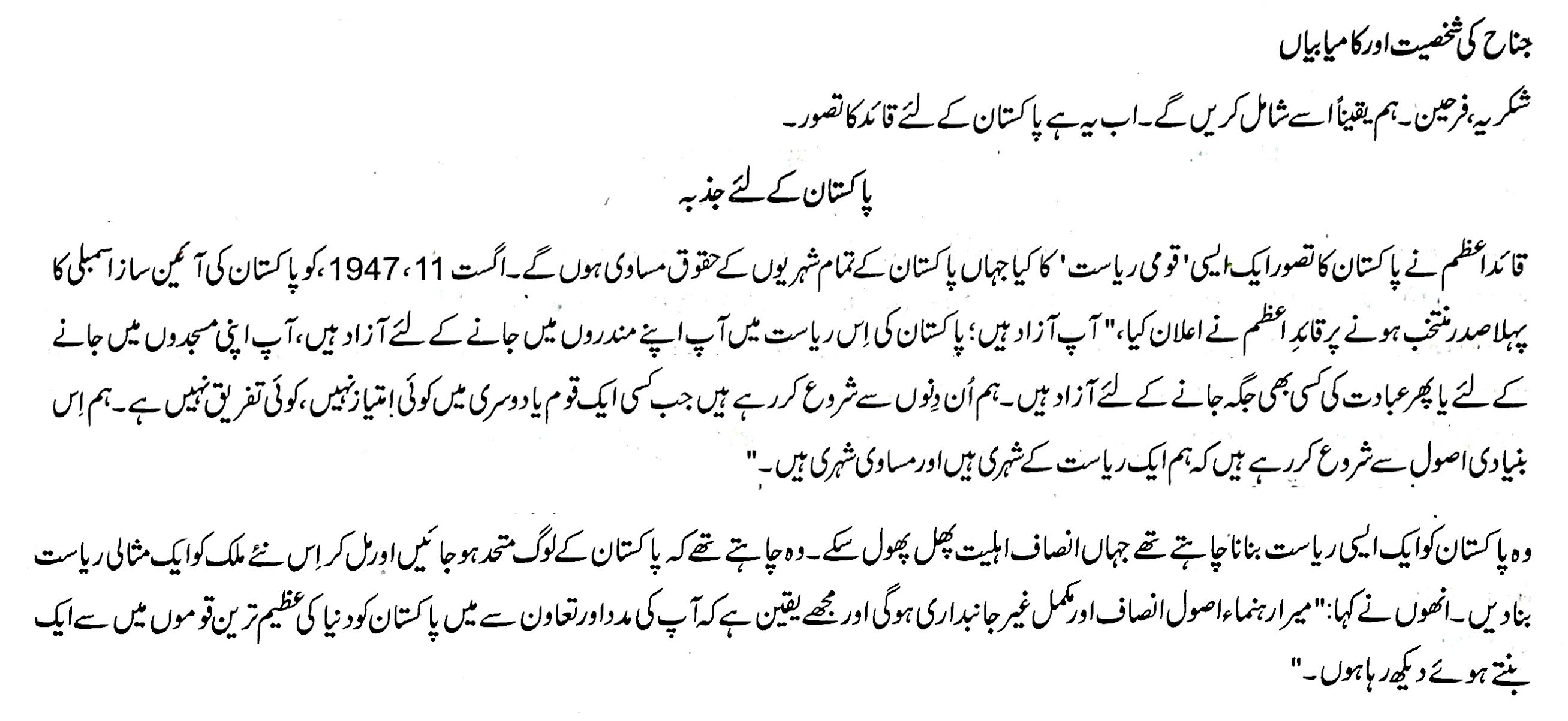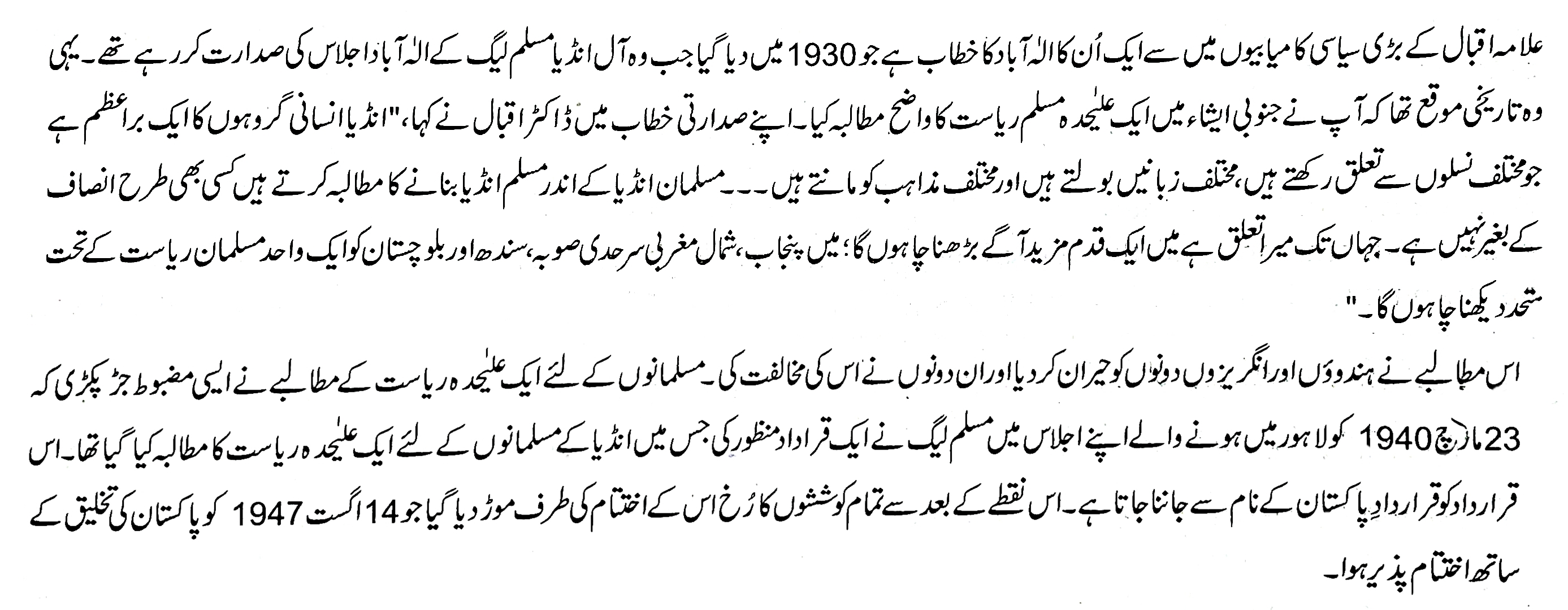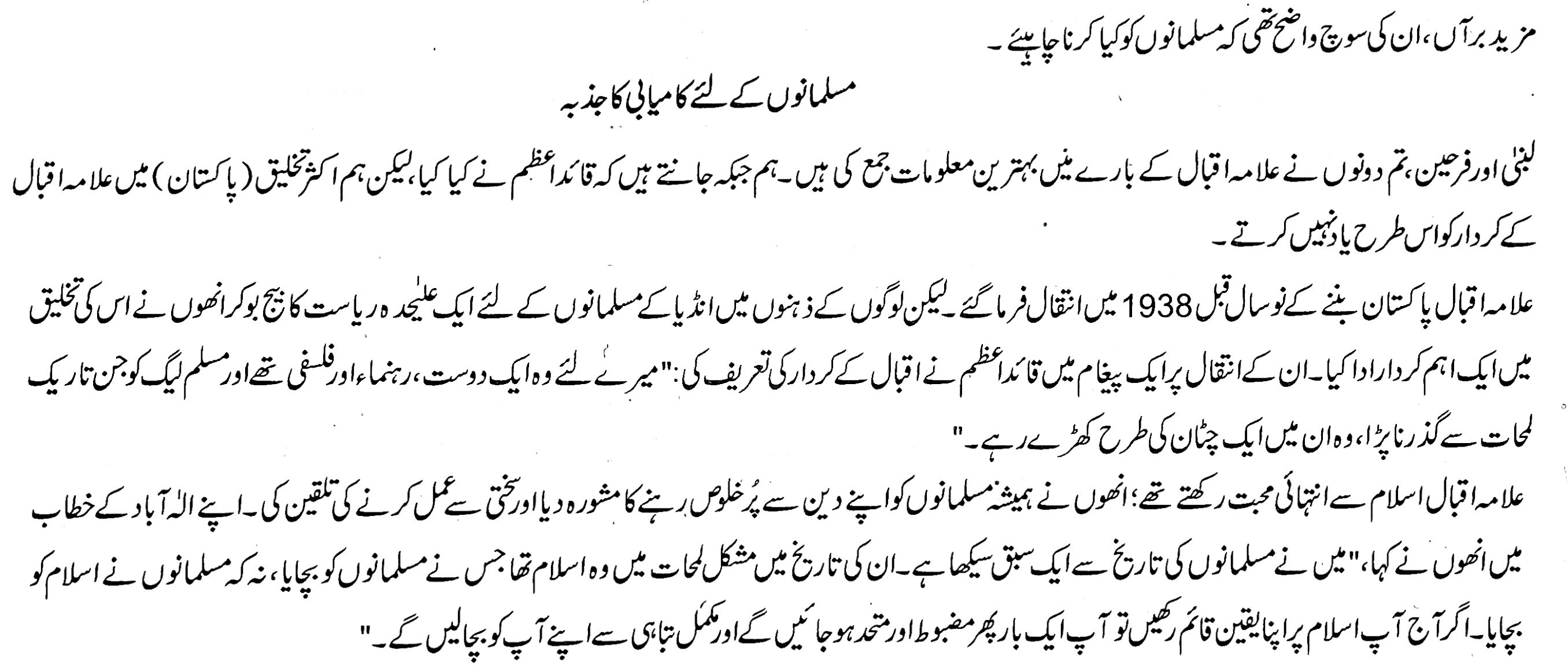The Great Visionaries
Lesson with Urdu translation
عظیم بصیرت مند
The teacher assigned the class a project for the summer vacations, titled 'The Great Visionaries'. The students were asked to work in groups of four and find information about the Quaid-e-Azam and Allama lqbal, the two great visionary leaders of the Pakistan Movement. They were asked to develop a booklet, a newspaper edition, or any other form of visual presentation based on the collected information. The members of one of the groups decided to split up the information gathering task; Huma and Tahira offered to look up information on some aspects of Jinnah's life, while Lubna and Farheen agreed to find information about lqbal. They decided to share the information with each other through emails. Here are some of their emails.
To: huma.latif@kmail.com; lubna22@circle.com; farheen_89@kingston.com
From: tahirabeauty@sunnyplace.com
Subject: Quaid-e-Azam
Date: June 11, 2018
Time: 2:29 pm
Dear Huma,
Here is some information that I have found about the Quaid-e-Azam:
Personality and Achievements
Quaid-i-Azam Mohammed Ali Jinnah was one of the most dynamic personalities of South Asia. His message of 'Unity, Faith and Discipline' and his determination and steadfastness, if he made the guiding principles by the nation, he can speedily set the nation on the path of progress and prosperity.
He was one of the top barristers of Bombay. But his greatest achievement, which is unparalleled in the recent history of the world, is the creation of Pakistan. The world has seen many leaders who have obtained independence for their people from undesired rulers, but few have achieved what the Quaid-e-Azam did; he created a new country. He led the Muslims of the sub-continent to achieve an independent state called Pakistan, where they could live honourably, according to the teachings of their faith and culture.
Regards.
Tahira
To: tahirabeauty@ sunnyplace.com; lubna22@circle.com; farheen_89@kingston.com
From: huma.latif @kmail.com
Subject: Quaid-e-Azam
Date: June 11, 2018
Time: 4:37 pm
Tahira, here is some more information that we can add in this section:
Moreover, Mohammed Ali Jinnah was the only leader in British India, who was popular not only among the Muslims but also had a great respect among the people of other faiths, including the Hindus, Christians, Sikhs and Parsis. Due to his tolerance and acceptance of all faiths, some Hindu leaders, like Gokhale and the famous Hindu poetess Sarojini Nido, called him 'the best Ambassador of Hindu Muslim Unity.'
Best wishes.
Huma
To: huma.latif @kmail.com; lubna22@circle.com; tahirabeauty@sunnyplace.com
From: farheen_89@kingston.com
Subject: Quaid-e-Azam
Date: June 14, 2018
Time: 4:30 pm
Huma and Tahira, you might want to add this vital piece of information in this section:
However, he was very clear about one thing: while Pakistan would be a state where the Muslims would be free to practise the teachings of their faith and to prosper economically. This is in no way meant that the people of other faiths, living in the geographical boundaries of the new state, would, in any way, be lesser citizens.
Farheen
To: huma.latif @kmail.com; lubna22@circle.com; farheen_89@kingston.com
From: tahirabeauty@sunnyplace.com
Subject: Quaid-e-Azam
Date: June 15, 2018
Time: 5:29 pm
Thank you, Huma. I agree with you. Now, here is some more information about him:
Political Acumen and Contribution
Initially, Quaid-e-Azam was a strong proponent of Hindu-Muslim unity and an active member of the Indian National Congress. But, as an outstanding political leader, he very soon sensed that the Indian National Congress was leading the Hindus of the sub-continent towards Hindu-Muslim polarization. This, he realized, would result in political and economic victimization of the Muslims in the region. Therefore, he decided to leave the Congress and join the Muslim League.
Soon after joining the Muslim League he became its president. He, very intelligently, pleaded the case of a separate homeland for the Muslims and succeeded in getting Pakistan. This was despite strong opposition from the two big power players in British India; the ruling British and the majority Hindus.
Have you found some more information?
Tahira
To:; lubna22@circle.com; farheen_89@kingston.com; tahirabeauty@sunnyplace.com
From: huma.latif@kmail.com
Subject: Personality and Achievements of Jinnah
Date: June 17, 2018
Time: 1:30 pm
Thank you, Farheen. We will definitely add this. Now here is the vision that the Quaid had for Pakistan:
Aspirations for Pakistan
Quaid-i-Azam envisioned Pakistan, as a 'nation state' ensuring equal rights for all citizens of Pakistan. On August 11, 1947, the Quaid-e-Azam, on his election as the first President of the Constituent Assembly of Pakistan, declared, "You are free; you are free to go to your temples, you are free to go to your mosques or to any other place of worship in this state of Pakistan. We are starting in the days when there is no discrimination, no distinction between one community and another. We are starting with this fundamental principle that we are all citizens and equal citizens of one State."
He also wanted Pakistan to be a state where justice and merit prevailed. He wanted the people of Pakistan to be united and to work towards making this new country, an exemplary state. He said: "My guiding principle will be justice and complete impartiality and I am sure that with your support and cooperation, I can look forward to Pakistan becoming one of the greatest nations of the world."
Alas! This great leader had to leave this world before he could transform his ideals into practical steps. It is now our responsibility to set the future directions for this great country by implementing the Quaid's vision of Pakistan. If we truly want to pay homage to our great Quaid, we should try and do the things he wanted us to do and not merely praise what he did. On every Independence Day, we should think of what we need to do to take Pakistan forward on the way to peace and prosperity.
Tahira, I think we now have enough information about the Quaid-e-Azam. Let's see what Lubna and Farheen find about Allama lqbal. We'll then meet and decide how to present all this information.
Best wishes
Huma
To:farheen_89 @ kingston.com;huma.latif @ kmail.com; tahirabeauty@sunnyplace.com
From: lubna22@circle.com
Subject: Allama lqbal
Date: June 18, 2018
Time: 6:32 pm
Dear Farheen,
Now that my cousin's wedding is over, I have managed to find the following information about the Poet of the East:
Personality and Achievements
Allama Muhammad lqbal, the poet of the East was, no doubt, a great poet, but poetry was only one of his many accomplishments. He began his professional career as a Professor of Arabic at the Oriental College, Lahore, after doing his M.A., in 1899. In 1905, he went to London to study law and received a law degree. He thus became a barrister by profession. But this does not mean that he gave up everything else. This versatile person continued his quest for knowledge in various fields and, in 1908, he was awarded a Ph.D. degree by the Munich University, in Germany, for his work on Persian philosophy. That is why he is also known as Dr. Muhammad lqbal.
Regards
Lubna
To: humailatif @kmail.com;tahirabeauty@sunnyplace.com; lubna22@circle.com
From: farheen_89@kingston.com
Subject: Allama lqbal
Date: June 19 2018
Time: 1:40 pm
Thanks, Lubna. Here's the information that I have found:
Political Acumen and Contribution
Allama lqbal also took an active part in politics and worked for the cause of the Muslims of South Asia. He was elected as a member of the Punjab Legislative Council in 1926, a post he held till 1929. By then, he had become deeply involved with the Muslim League activities. Due to his commitment to the cause of Muslim rights in India, he was soon elected as the President of the Punjab branch of the All India Muslim League, a post he held till the time of his death.

One of lqbal's biggest political contributions is his Allahabad address, which he delivered in 1930, when he presided over the Allahabad meeting of the All-India Muslim League. It was on this historic occasion that he made a definite demand for a separate Muslim State in South Asia. In his presidential address, Dr. lqbal said, "India is a continent of human groups belonging to different races, speaking different languages, and believing in different religions.... The Muslim demand to create a Muslim India within India is in no way without justice. For my part I would like to go one step further; I would like to see the Punjab, North West Frontier Province, Sindh and Baluchistan unite under a single Muslim State".
However this demand shocked both the Hindus and the British alike and they both opposed it. This demand for a separate state for Muslims took such firm root that at its meeting in Lahore, on March 23, 1940, the Muslim League passed a resolution demanding a separate state for the Muslims of India. This resolution is known as the Pakistan Resolution. From this point onwards, all efforts were directed towards this end, culminating in the creation of Pakistan, on August 14, 1947.
Best wishes.
Farheen
To:huma.latif @ kmail.com; farheen_89 @ kingston.com; lubna22@circle.com
From: tahirabeauty@sunnyplace.com;
Subject: Allama lqbal
Date: June 20, 2018
Time: 11:29 am
Moreover, he had clear ideas about what Muslims should do.
Aspirations for Muslims
Lubna and Farheen, both of you have collected excellent information about Allama lqbal. While we all know what the Quaid-e-Azam did, we often do not exactly recall the role of Allama lqbal in the creation.
Allama lqbal died in 1938, nine years before the creation of Pakistan. But he played a major role in its creation, by planting the seeds of a separate state for the Muslims of India in people's minds. Quaid-e-Azam, praised lqbal's role in a message on his death: To me he was a friend, guide and philosopher, and during the darkest moments through which the Muslim League had to go, he stood like a rock'.
Allama lqbal had a great love for Islam; he always advised the Muslims to remain true to their faith, and to practise it in letter and spirit. In his Allahabad address he said: "I have learned one lesson from the history of Muslims. At difficult moments in their history, it is Islam that has saved Muslims and not Muslims that have saved Islam. If, today, you put your faith in Islam, you will become strong and united once again and save yourself from complete destruction."
Tahira
